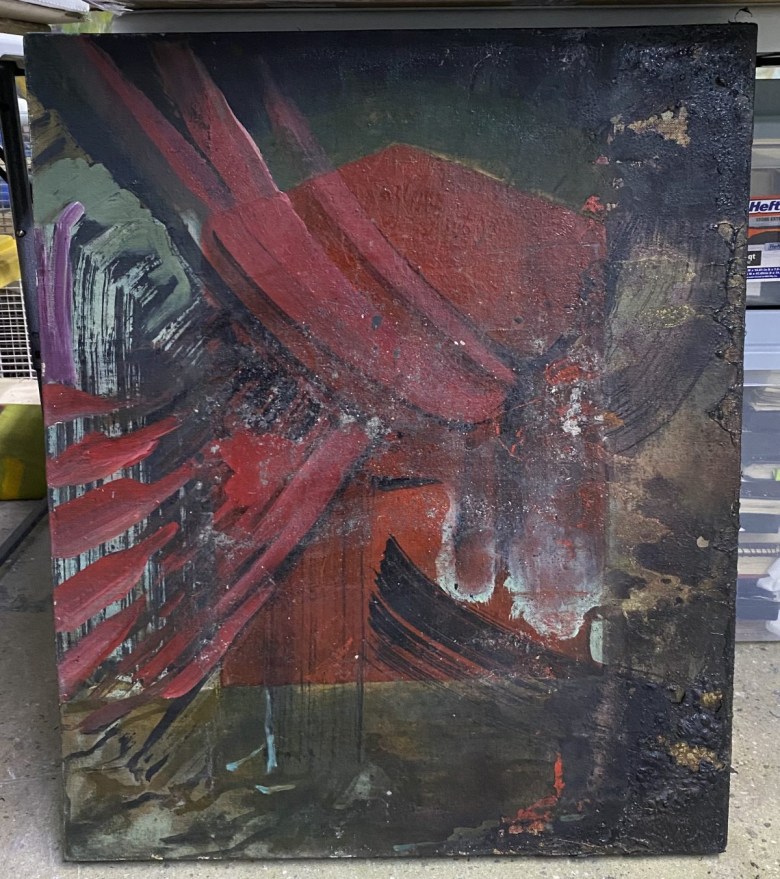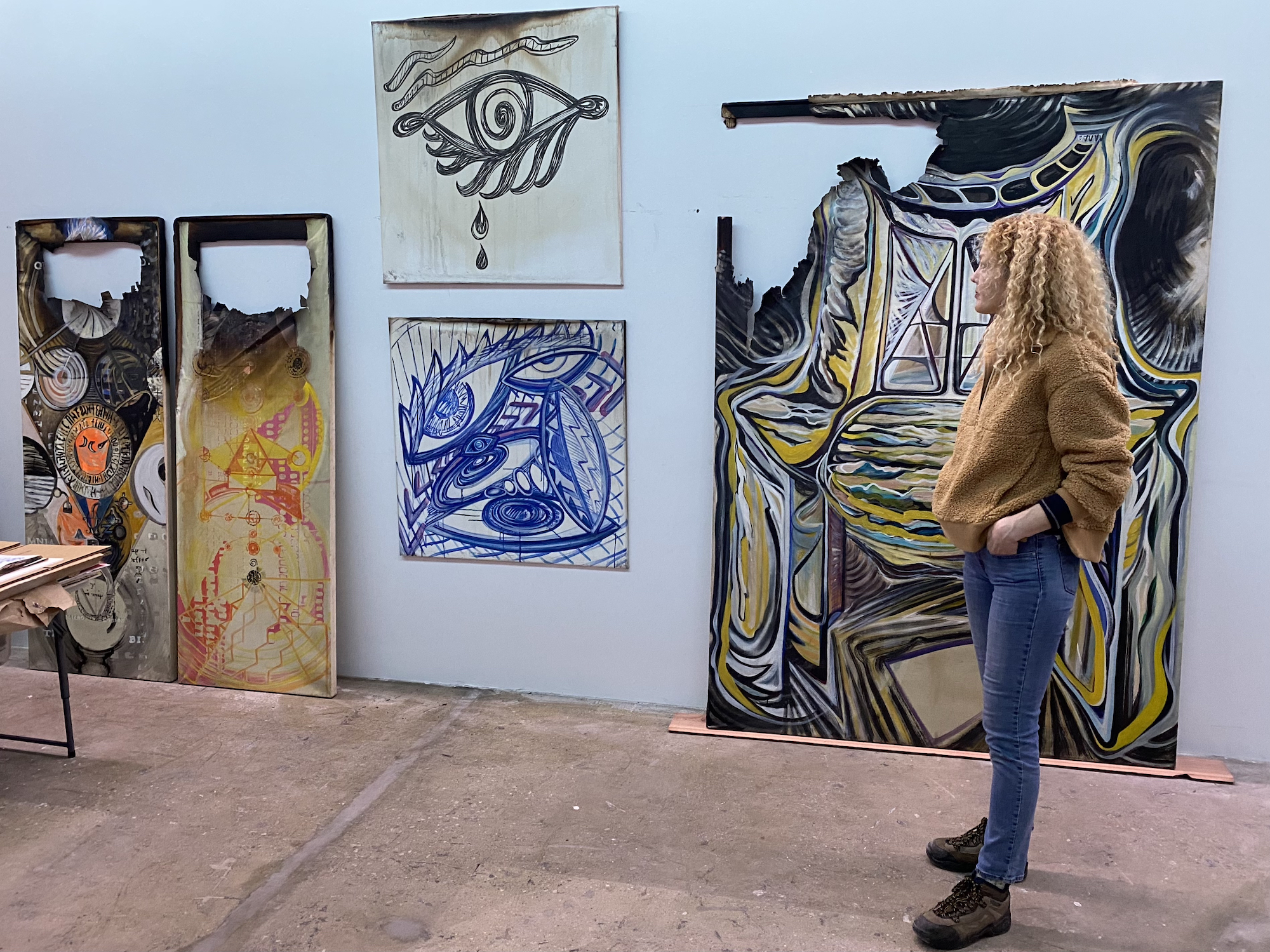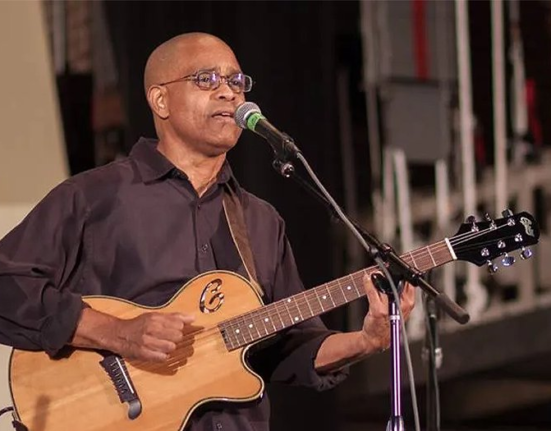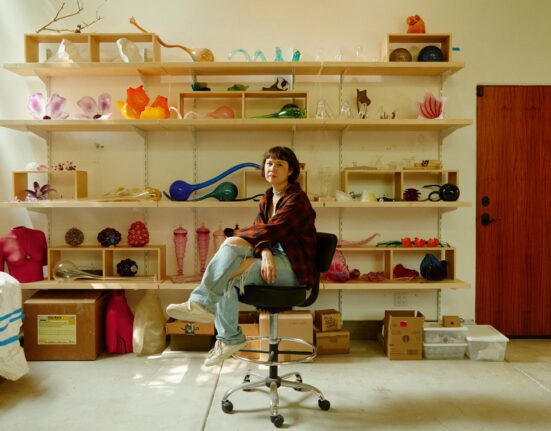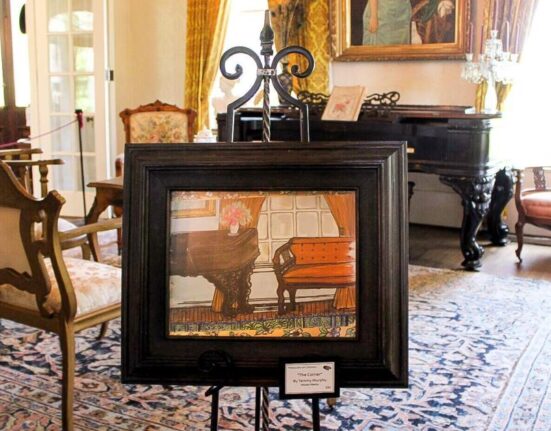LOS ANGELES — Malado Francine was in Senegal visiting her parents when she awoke on February 1 to a flood of messages on her phone. There had been a fire the night before in her Los Feliz apartment and studio, a 1923 adobe duplex she called home for over a decade and where hundreds of artworks were stored. She wasn’t able to make it back to survey the damage until the following evening.
The blaze began in a neighbor’s garage before spreading to the apartment above hers and spilling down to the first floor. The back bedroom, which she used for art storage, housing decades of paintings, sketchbooks, and art supplies, was engulfed by flames. Neighbors informed her that it took dozens of firefighters 40 minutes to put it out.
“But by then, most of what I had in there had evaporated,” she told Hyperallergic. “All my racks and rolls, all my supplies, all my precious things, all my finished work, were in the back room.”
Friends and neighbors helped her rescue any unscathed artwork, laying it out in the driveway to dry after being doused by firehoses and recent rain storms before packing it up and hauling most of it off to a storage facility. She was able to secure a space in a studio building in Northeast LA, where she brought the few intact and salvageable paintings; however, she says other artists in the complex have complained of the lingering smell of smoke.
“I need to go through the mourning process of looking at this work,” she said. “It’s painful.”
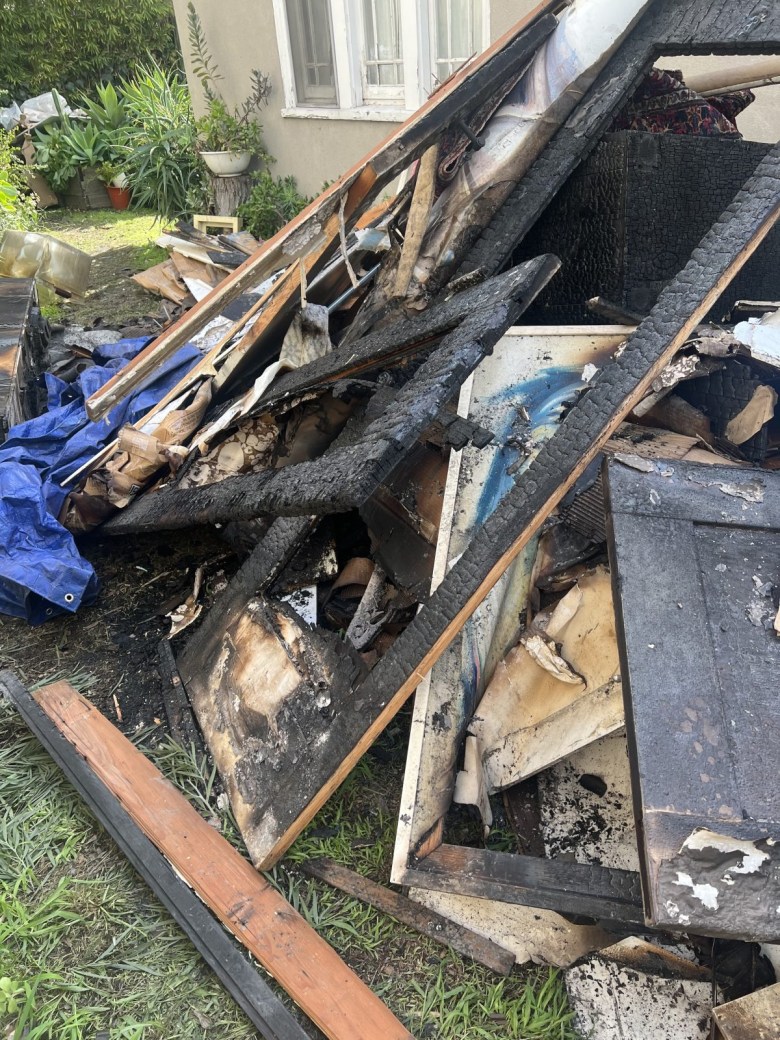
Although her living quarters were relatively unaffected — her bed was still made, though damp and dirty — the residence was left uninhabitable. A friend offered her his place while he was out of town, and she recently moved into a short-term rental, but the rising costs of housing in LA, especially when compared to her rent-controlled unit, may make it difficult to return to the community she has lived and worked in for years. Though she had renter’s insurance, she learned too late that it did not cover artwork and is still unsure how much of her losses will be taken care of. A GoFundMe has raised almost $35,000 of its $75,000 goal, easing some immediate financial concerns.
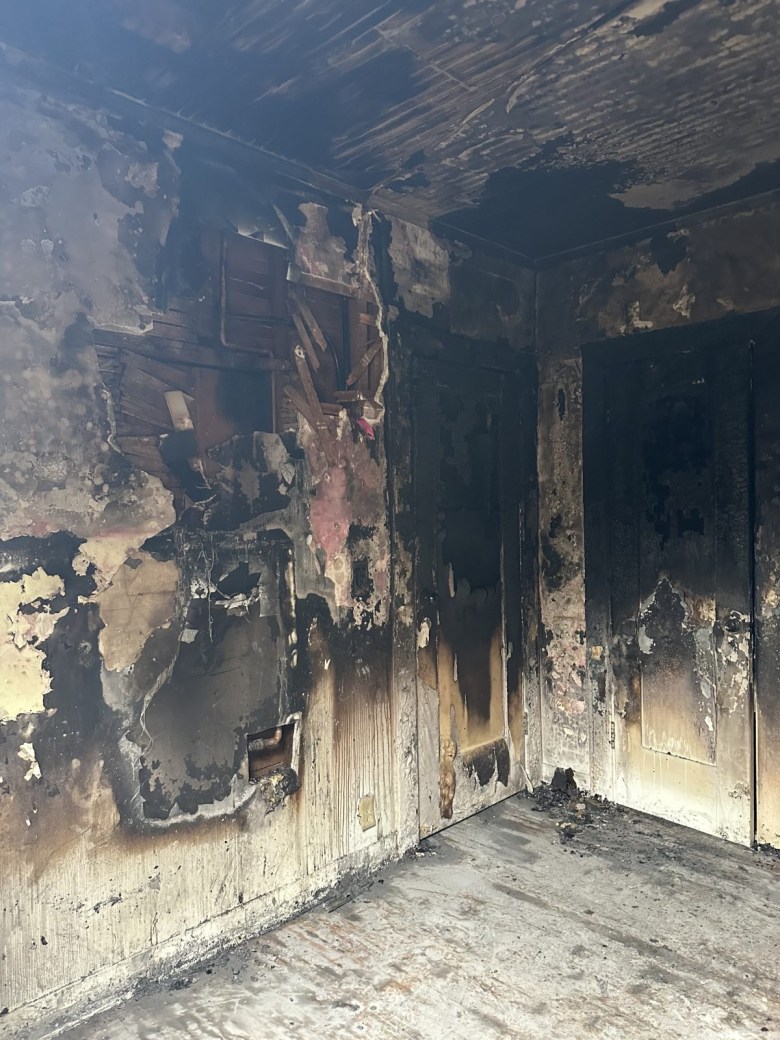
Francine’s story may be familiar to artists who must balance living in a culturally rich but expensive city with stark financial realities. Apartment studios are not uncommon, especially in places like LA, where rising real estate prices make the combination of live-work spaces not just attractive but necessary. Add to this the prevalence of wildfires in the Golden State, and the precarity that many artists face here can have devastating consequences.
But the scourge of fires is by no means limited to California. Artist Sharon Louden was displaced from her Brooklyn apartment on Christmas Day 2013, after it was engulfed in smoke and flames emanating from the fireplace. Her husband, the jazz musician Vinson Valega, surmises it was the result of soot buildup in the chimney, a problem he claims the landlord had dismissed. Louden grabbed her computer and little else, returning the next day after firefighters extinguished the blaze to pack up what was salvageable to put in storage.
Although Louden had a separate art studio, her cross-disciplinary practice is interwoven with her life, which was upended by the fire. Longtime New Yorkers, the couple had lived through 9/11 and Hurricane Sandy and thought this might be an opportunity to get away from the city. Louden had recently published a book — titled Living and Sustaining a Creative Life: Essays by 40 Working Artists — and embarked on a 230-day book tour across the country. “The road kept us living,” she said.
When the Woolsey Fire swept through Malibu in 2018, it completely destroyed Lita Albuquerque’s home and studio, where she had lived since 1990 and where she and her husband had raised four children. She lost five decades of artwork, rare pigments, and much of her archives.
“At the time I thought, ‘Are we ever gonna recover?’” she told Hyperallergic. “My husband said: ‘It’s not about recovery, it’s about reinvention.’”
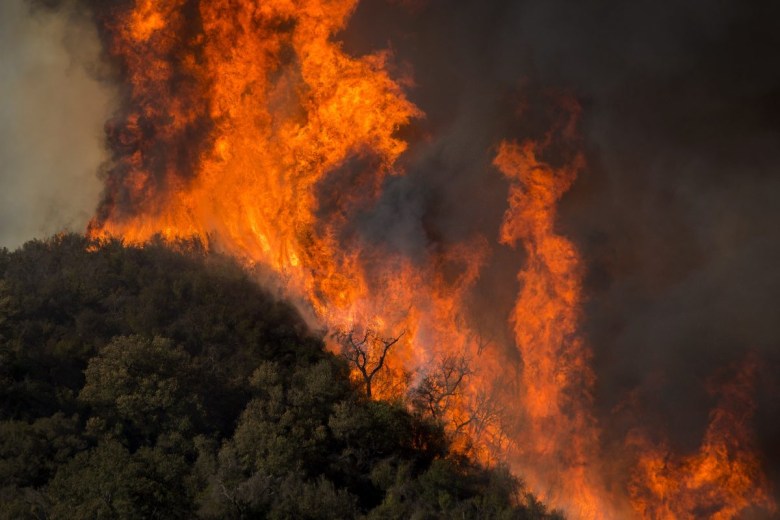
More than five years later, Albuquerque is rebuilding on the same spot, and “things are finally coming to fruition.” The devastating loss has, in a way, allowed her to connect with her birthplace of Tunisia, where she was born and raised until the age of 13. She has designed her new home with a dome that recalls the Tunisian architecture of her youth.
Albuquerque is certainly more fortunate than many artists who aren’t able to rebuild their homes at all. Renters like Francine are less likely to have that option, and while her landlord is legally required to offer her the unit after it is made habitable, that would mean finding affordable housing in the interim.
Regardless of their individual circumstances, it is often a long process for artists to put the pieces back together after a studio or home fire. In the introduction to his 2016 book On Fire, which collects accounts of 10 artists who have lost their studios to blazes, Jonathan Griffin writes of “an instant when time spun on its axles, when they realized that the tiny refuge of safety and freedom that they had won for themselves was gone …. It would take months and years, resources and resolve to claim it back.”
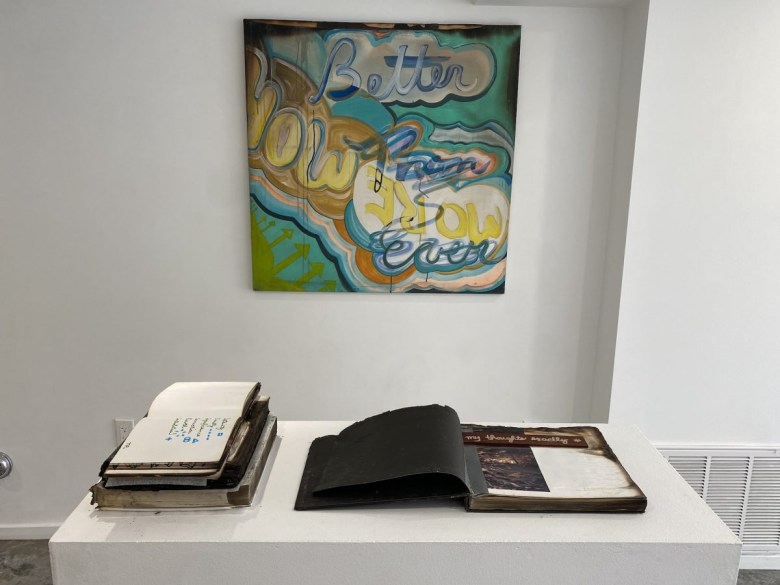
Francine’s tragedy is quite recent, but she is beginning to find meaning from the ashes. Her burned paintings and notebooks are included in the group exhibition Of Flames and Shadows Gone Astray, which recently opened at Bermudez Projects. The show features artists who use fire in their works to explore themes of loss, perseverance, and resilience, with Francine being the only participating artist whose work is not intentionally fire-damaged. The singed edges and burn marks lend an element of poignant irony to the text painting “Better Than Ever (MORE MORE)” (2018/2024), and two vertical canvases based on New York Lotto tickets with their themes of fortune and risk. In others, like “House on Fire” (2012/2024), the connection between the original subject matter and current condition is uncanny.
“Sometimes the burning of the edges adds a new element,” she said. “Before, they were unfinished, but now maybe the fire finished them.”
